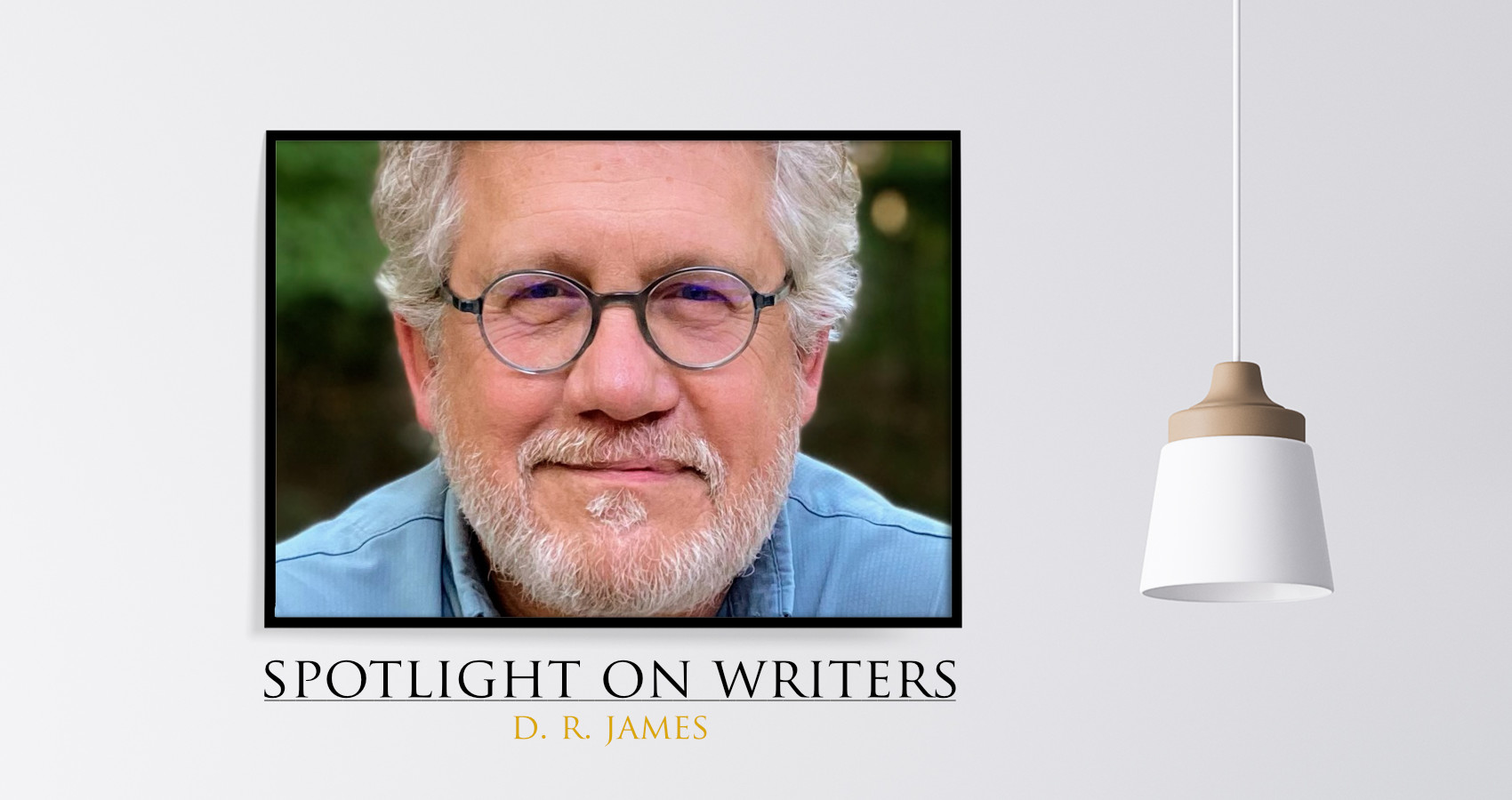Spotlight On Writers
D. R. James
- Where, do you hail from?
- What is the greatest thing about the place you call home?
It’s in the woods, and all we have to do to road cycle along gorgeous country roads is leave our garage. We had a little T@B travel trailer but sold it when we moved to the woods and realized we didn’t need to drive anywhere to get what we wanted. Our backyard is like a campsite but without the humongous-RV crowd that would just stare at us when we pulled our little tear-drop into a campground and donned spandex to hit the road on our bikes. The wildlife around the house also fascinates me, and I love being by myself in relative tranquility. (See answer to #5.)
- What turns you on creatively?
Starting. All I have to do is start, and something almost always comes of it. I use gimmicks to provide impetus and material—various kinds of prompts and word lists and forms/rhythms to follow, when necessary—but merely starting is the main thing. I rarely know where a poem is going to go, and that too turns me on. The inevitable surprise, and anticipating it, makes the process so much fun. Fascinating.
- What is your favorite word, and can you use it in a poetic sentence?
Oh, I couldn’t pick just one, but probably, if any, one that I make up. For example, in my poem “Let It Go, Buddha,” I use a made-up word to capture personal and cultural influences that shaped me early on. Here’s the sentence:
For once again I’ve had
the wrong idea: Calvi-
tholicism’s indissoluble
oil slick floating on
Buddha’s smooth sea
of equanimity.
Perhaps some or most readers don’t know what I mean—and I did consider quite a bit whether I’d even use Calvitholicism and how—but I felt I wanted and needed it to get at both the concepts and the mash-up. I decided to line-break split it up to give readers a better shot at it. But it’s playful too, which goes along with the slightly snarky but serious feel of the whole poem:
Let It Go, Buddha
Let it go, Buddha
keeps telling me, still so
attached to detachment
that veins I imagine
at his temples throb
like the chanting
of ancestors on a CD
I bought cheap for $7.97.
For once again I’ve had
the wrong idea: Calvi-
tholicism’s indissoluble
oil slick floating on
Buddha’s smooth sea
of equanimity. Try
as I might – and, well,
there it is, attached at
the straining hip of effort.
Zen Master Seung Sahn says
wanting enlightenment’s
a big mistake. I say
add it to the list:
the first marriage,
the first religion,
the second – trying
to save the whole world
with words.
- What is your pet peeve?
Small talk. I think I’m introverted anyway, but the prospect of having to engage in or at least listen to small talk fortifies my inclination not to socialize. This probably goes hand in hand with my preferring poetry over prose, since I can’t bear wordiness when writing or reading poems I like, whereas prose—not good prose, of course—thinks it can get away with mindless word-spinning, and usually does. I do best, if I socialize at all, in small groups of people who don’t small talk. (I do, however, understand the social significance, even necessity, of small talk, but that doesn’t help me much. Surprisingly, I can small talk with the best of them, but it doesn’t take me long before I’m trying to steer the conversation into, for me at least, more interesting threads. But that takes such effort, I’d rather be by myself.)
- What defines D. R. James?
Well, that I don’t like questions like this? (No offense intended. I get the motive.) I almost rebelled against the favorite-word question but realized I could fudge against its exclusivity and have fun with it. But defining myself or any individual seems to counter the reality of being human or alive at all, so I can’t fudge it. Defining—except for words—and analyzing—except for compounds or the like—cut off more than reveal. So, what reveals D. R. James? Try reading some of his poems. And avoid small-talking him. (There, another made-up favorite word!)
- For Therapy, I Mix Metaphors - October 13, 2025
- Tracing Your Two Lines - June 16, 2025
- School Bus - March 20, 2025



